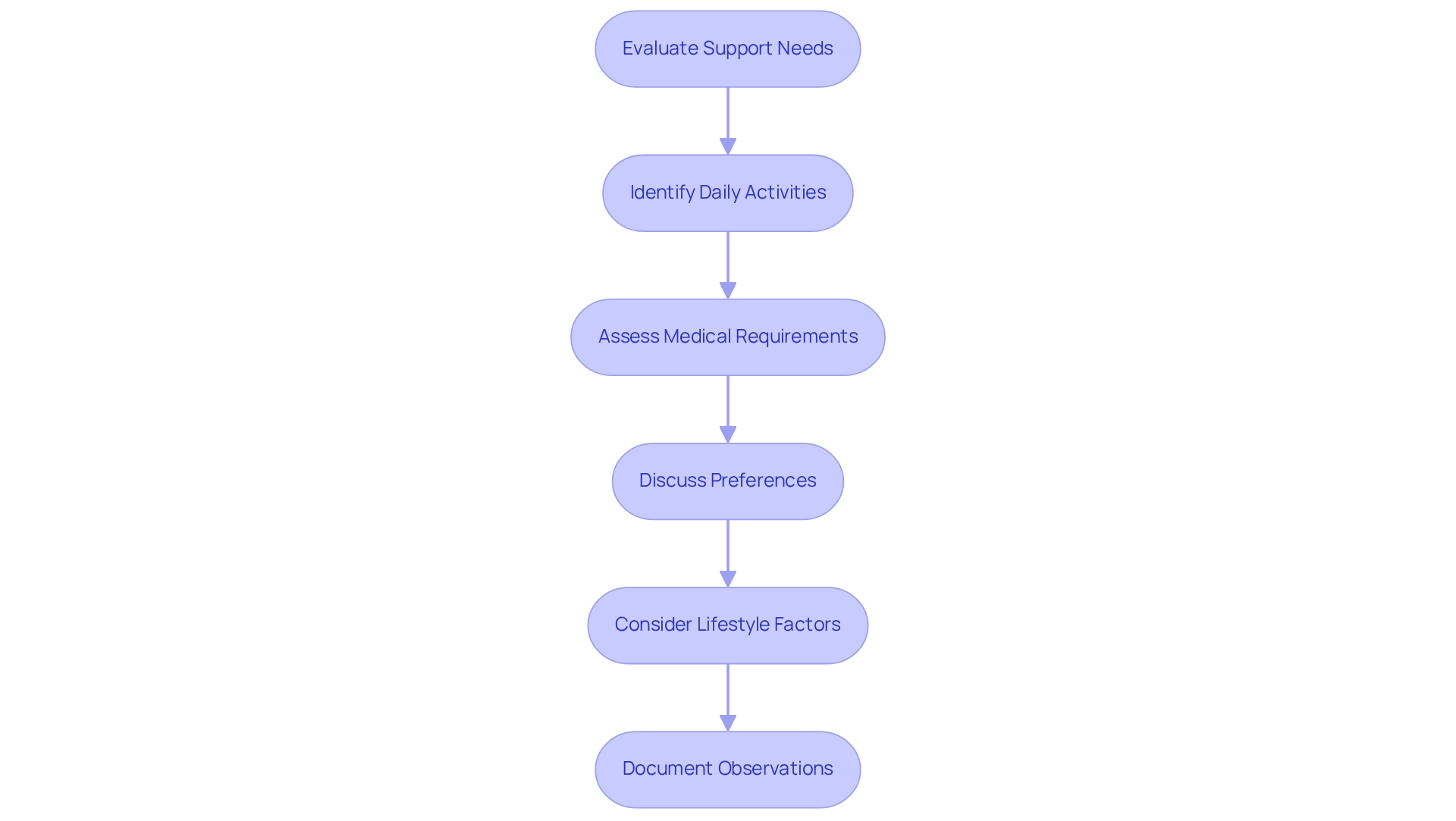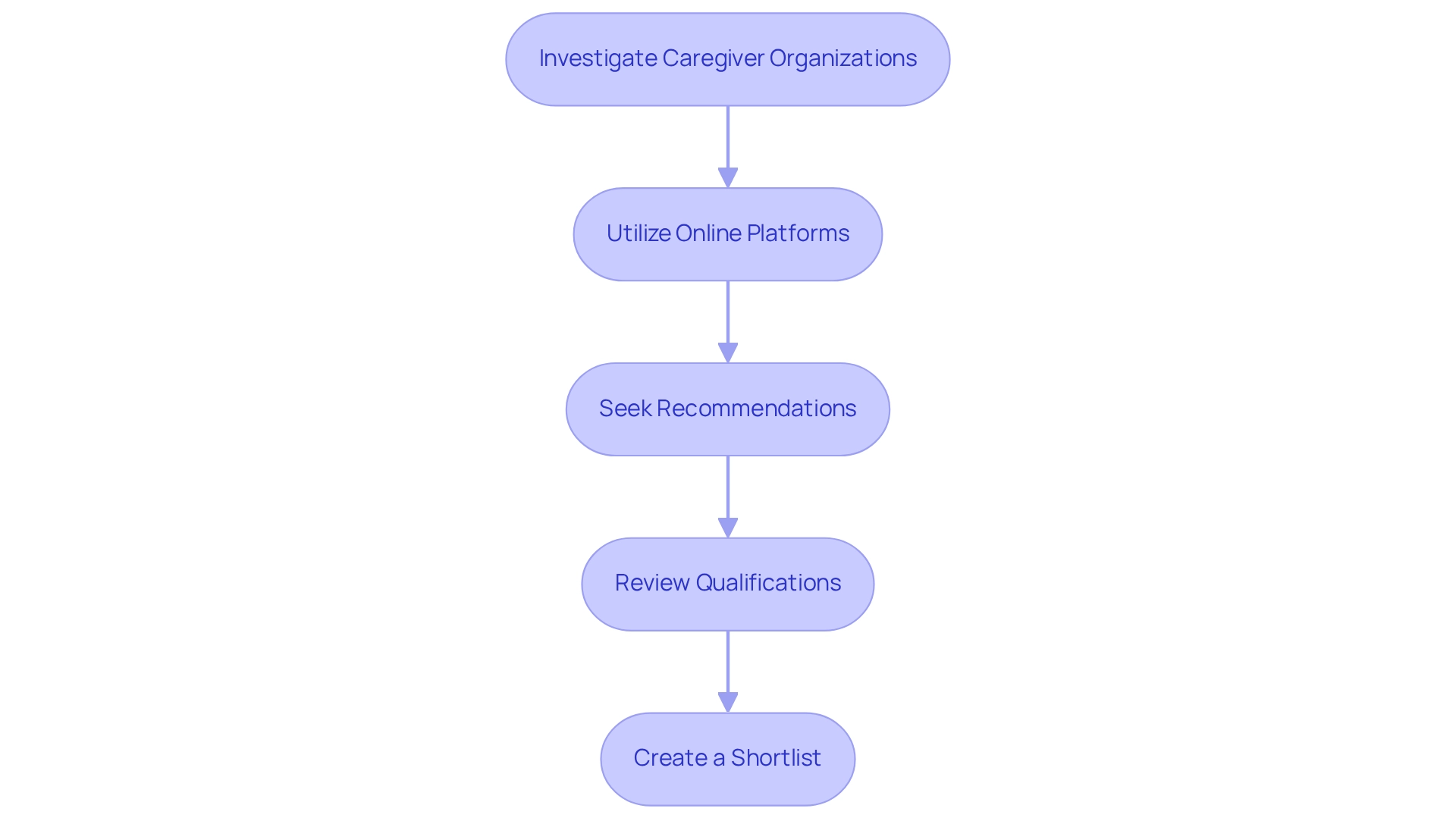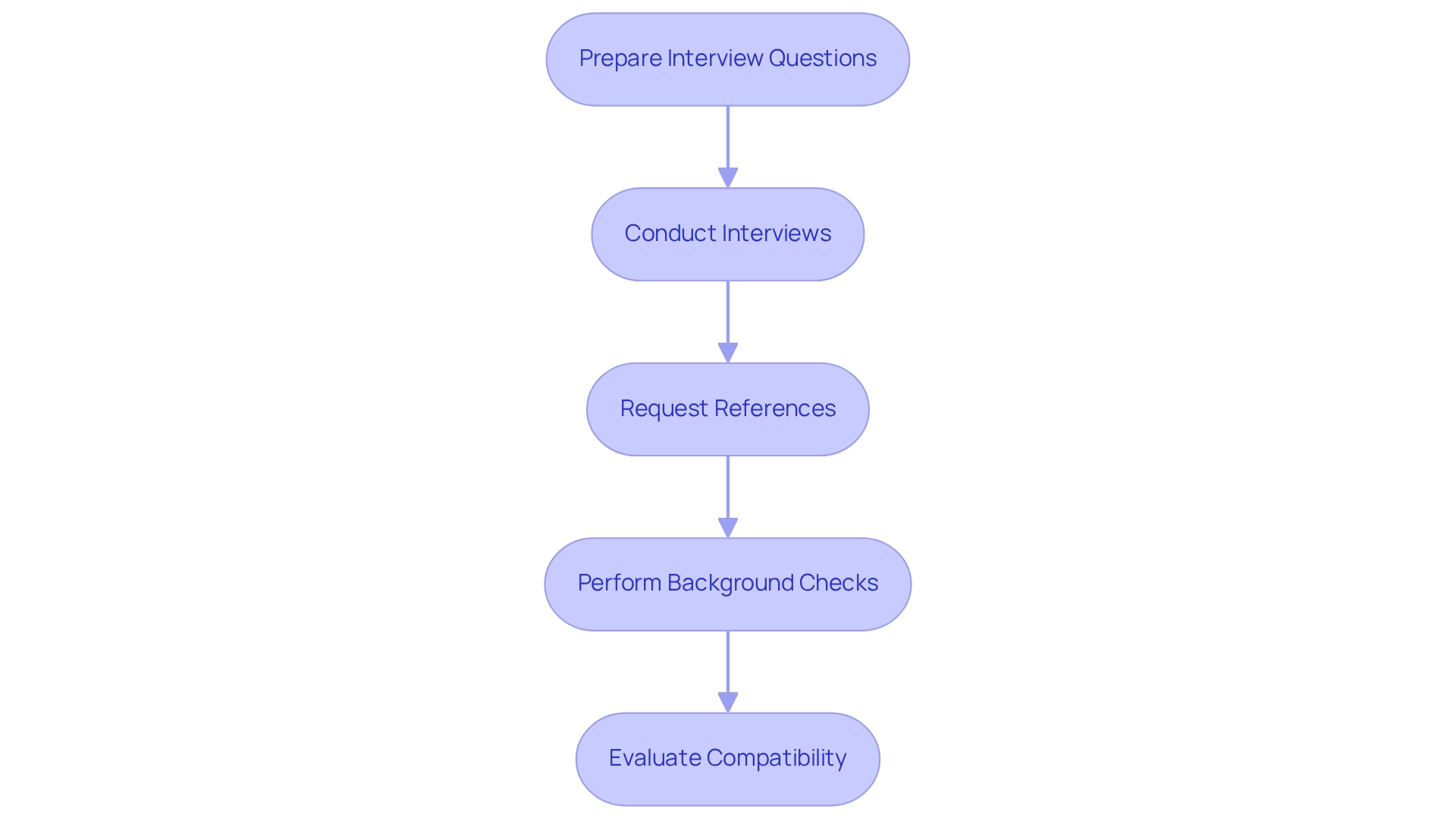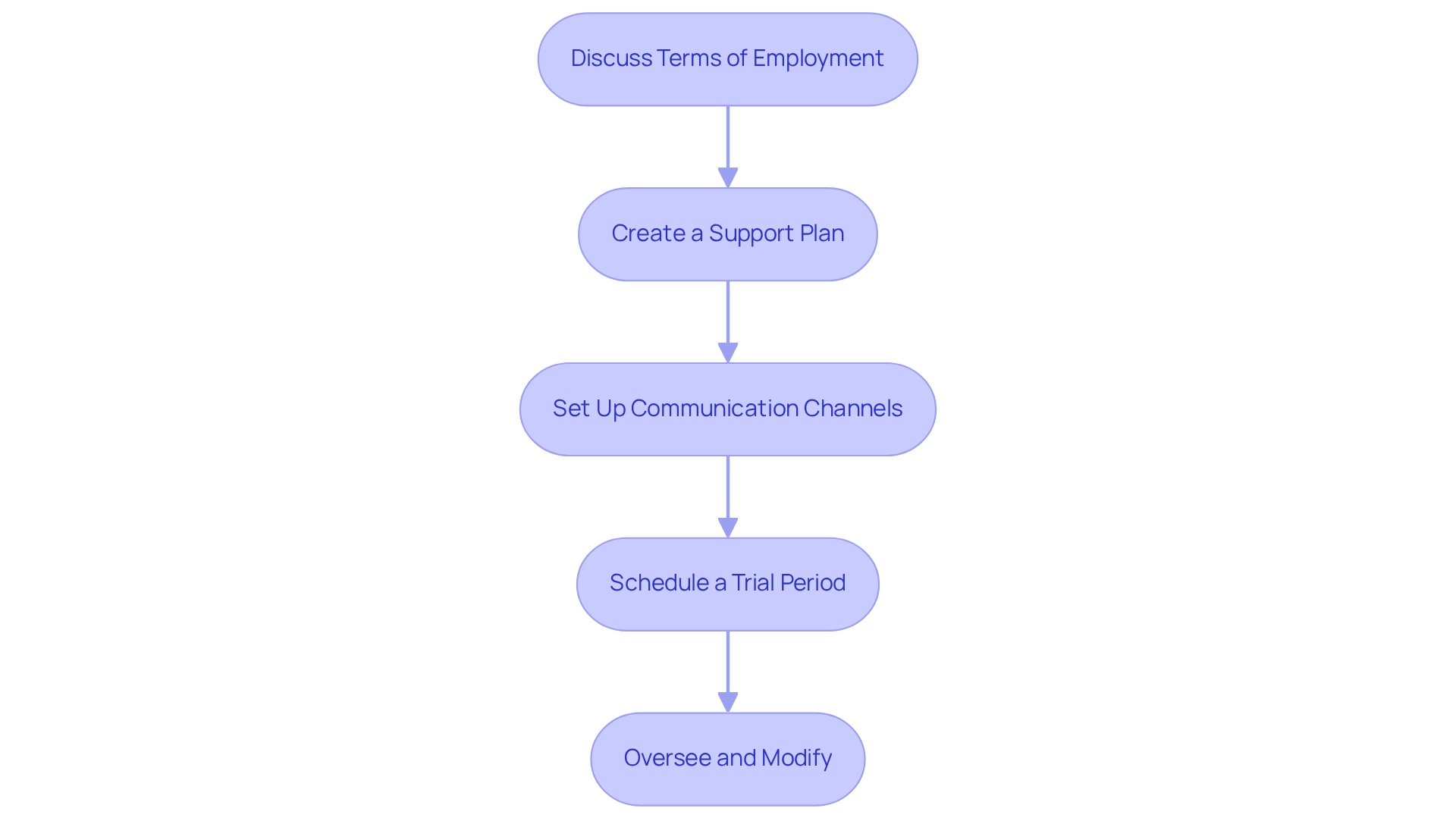Overview
The article “4 Steps to Hire a Caregiver for Disabled Adults” serves as a compassionate guide for families navigating the important decision of hiring a caregiver tailored to the unique needs of disabled adults. It outlines four essential steps:
- Assessing care needs and preferences, which acknowledges the emotional weight of this decision.
- Identifying and evaluating potential caregivers, ensuring families feel supported in their search.
- Conducting interviews and background checks to foster trust and safety.
- Finalizing the hiring process and establishing a care plan.
Throughout this journey, the article emphasizes that thorough preparation and ongoing communication are crucial for ensuring high-quality care and a meaningful match between caregiver and client. Remember, you are not alone in this process; we’re here for you every step of the way.
Introduction
Navigating the complexities of caregiving for disabled adults can feel overwhelming, filled with emotional and logistical challenges. As families strive to ensure their loved ones receive the best possible support, it becomes essential to understand the steps involved in selecting the right caregiver.
By assessing individual care needs, conducting thorough background checks, and establishing a personalized care plan, each phase plays a vital role in creating a nurturing environment.
This article explores a comprehensive approach to caregiver selection, offering insights and practical steps designed to empower families in making informed decisions that enhance the quality of life for their loved ones.
Remember, you are not alone in this journey; we’re here for you every step of the way.
Assess Care Needs and Preferences
Begin by conducting a thorough evaluation of the individual’s support needs, focusing on their physical, emotional, and social aspects. This step is crucial, as 19% of older adults report that their providers regularly assess the essentials of age-friendly support, highlighting the necessity for comprehensive evaluations. Consider these steps:
-
Identify Daily Activities: Take note of the daily tasks the individual requires help with, such as bathing, dressing, meal preparation, medication management, and mobility support. It’s important to recognize that a significant percentage of seniors need assistance with bathing and dressing, which underscores the relevance of this step.
-
Assess Medical Requirements: Collaborate with healthcare professionals to understand any medical conditions that may require specialized attention or monitoring. Engaging with experts can equip families with the necessary resources and support, ensuring their loved ones receive appropriate care and assistance.
-
Discuss Preferences: If possible, engage the individual in conversations about their preferences regarding support providers, including aspects like gender, age, and personality traits. This dialogue is vital for fostering a comfortable and trusting relationship between the support provider and the individual.
-
Consider Lifestyle Factors: Reflect on the person’s lifestyle, including their daily routines, hobbies, and social interactions, to ensure that the caregiver can effectively support these important aspects. Current trends indicate that community-focused long-term support necessitates new frameworks to unify assistance for vulnerable individuals, making this consideration particularly relevant.
-
Document Observations: Create a thorough document that outlines the support requirements and preferences, serving as a reference during the hiring process. This documentation is essential for ensuring that all parties involved have a clear understanding of the individual’s needs.
By following these steps, families can ensure a comprehensive assessment of support requirements, ultimately leading to improved outcomes for disabled adults and their caregiver for disabled adults. As healthcare professionals emphasize, evaluating both physical and emotional needs is essential for delivering effective support.

Identify and Evaluate Potential Caregivers
Once you have a clear understanding of the support requirements, it’s important to identify potential providers who can meet those needs. Here are some steps to guide you:
- Investigate caregiver organizations: Take the time to research nearby home support agencies, such as Best Nurses Registry, which specialize in providing private duty RNs and LPNs as caregivers for disabled adults. These agencies often have pre-screened applicants with confirmed qualifications, ensuring that you receive quality service. Best Care Nurses Registry has a proven track record of satisfied clients who have experienced compassionate and effective care.
- Utilize Online Platforms: Consider exploring online assistance platforms where you can post job listings and review profiles of independent providers. This can be a helpful way to find qualified professionals, such as a caregiver for disabled adults, who can provide the necessary support tailored to your loved one’s needs.
- Seek Recommendations: Don’t hesitate to ask friends, family, or healthcare professionals for suggestions of reliable providers they may know. Personal referrals can lead you to compassionate individuals who offer not just physical support, but also emotional reassurance and education about health conditions, which is essential for the well-being of your loved one.
- Review Qualifications: It’s crucial to assess the credentials of prospective attendants, including certifications (e.g., CNA, HHA), their experience with similar support needs, and any specialized training they may have. This step is vital to ensure that the provider can deliver efficient and tailored support. Remember, choosing home health care is not only cost-effective and convenient, but it also allows for a more personalized approach to care.
- Create a Shortlist: Compile a shortlist of candidates who meet the necessary qualifications and have positive reviews or references. This will help you make an informed decision when selecting the right provider for your loved one.
Your comfort and the well-being of your loved one are our priorities. We’re here for you every step of the way.

Conduct Interviews and Background Checks
After narrowing down your list of potential caregivers, it’s essential to conduct interviews and background checks to ensure the best fit for your loved one. This process can feel overwhelming, but we’re here to guide you through it.
- Prepare Interview Questions: Begin by creating a thorough list of inquiries that explore the individual’s experience, their methods of support, and how they manage specific situations. Consider asking about their knowledge of disabilities similar to those of the person requiring assistance. This can provide insight into their ability to meet specific needs.
- Conduct Interviews: Schedule interviews with each candidate, paying close attention to their communication skills, empathy, and overall demeanor. Observing how they interact can reveal their suitability for the role, ensuring that your loved one feels comfortable and understood.
- Request References: Don’t hesitate to ask candidates for references from previous employers or clients. Following up with these references can offer valuable insights into the individual’s reliability, performance, and overall effectiveness in similar roles, helping you make a more informed decision.
- Perform Background Checks: It’s crucial to conduct thorough background checks, including criminal history, driving records (if transportation is involved), and verification of certifications. Utilizing professional services can enhance the thoroughness of this process, ensuring that all necessary checks are completed for your peace of mind.
- Evaluate Compatibility: Finally, assess how well the provider’s personality aligns with the individual’s preferences and needs. A compatible match can significantly enhance the caregiving experience, fostering trust and comfort.
Implementing these steps not only aids in choosing a qualified provider but also contributes to a safer and more supportive environment for disabled adults and their caregivers. Research shows that a structured interview procedure, along with data-informed decision-making, can lead to better selection outcomes for caregivers, ultimately enhancing the quality of service delivered. Remember, your loved one deserves the best care possible, and taking the time to find the right fit is a loving step towards ensuring their well-being.

Finalize Hiring and Establish Care Plan
Once you have selected a caregiver, it’s essential to finalize the hiring process and establish a comprehensive care plan that truly reflects your needs and concerns:
-
Discuss Terms of Employment: Begin by clearly outlining the terms of employment, including hours, pay rate, responsibilities, and any benefits. It’s vital to ensure mutual agreement on these terms to foster a positive working relationship, which is the foundation of trust.
-
Create a Support Plan: Collaborate with the caregiver to devise a tailored support strategy that outlines specific tasks, routines, and objectives for the individual receiving assistance. This plan should encompass medical needs, personal preferences, and emergency procedures, ensuring a customized approach to care that respects individual dignity.
-
Set Up Communication Channels: Establish regular communication channels among the caregiver, the individual, and family members. This ensures that everyone remains informed and actively involved in the care process, which is crucial for effective caregiving and emotional support.
-
Schedule a Trial Period: Implementing a trial period can be beneficial to assess the caregiver’s compatibility and effectiveness. This allows for essential modifications to occur, guaranteeing that the caregiver addresses the distinct requirements of the individual in a supportive manner.
-
Oversee and Modify: Regularly assess the support strategy and the caregiver’s effectiveness. Ongoing supervision enables prompt modifications, ensuring that the individual receives the finest quality of assistance tailored to their evolving needs.
By following these steps, families can create a nurturing environment that enhances the quality of life for disabled adults while also alleviating the emotional toll often associated with being a caregiver for disabled adults. Your commitment to personalized care not only fosters trust but also promotes better recovery outcomes, as highlighted in case studies showcasing the benefits of tailored care plans. Remember, we’re here for you, and your comfort is our priority.

Conclusion
Navigating the journey of selecting the right caregiver for disabled adults can feel overwhelming, but it is a process that, with careful consideration and planning, can lead to positive outcomes. By starting with a thorough assessment of care needs and preferences, families can ensure that the specific physical, emotional, and social requirements of their loved ones are identified and addressed. Understanding daily activities, medical needs, and personal preferences lays a strong foundation for effective caregiver selection.
Once care needs are established, identifying and evaluating potential caregivers becomes the next crucial step. Utilizing caregiver agencies, online platforms, and personal referrals can help discover qualified professionals who possess the necessary skills and compassion. Conducting interviews and background checks not only ensures that the selected caregiver meets the qualifications but also aligns well with the individual’s personality and needs.
Finalizing the hiring process and establishing a comprehensive care plan is essential for creating a supportive environment. Clear communication and regular monitoring of the caregiver’s performance help maintain a high standard of care. By fostering a collaborative approach, families can significantly enhance the quality of life for their loved ones, alleviating some of the emotional burdens associated with caregiving.
Ultimately, this structured approach to caregiver selection empowers families to make informed decisions that improve the overall caregiving experience. Emphasizing personalized care builds trust between caregivers and individuals, leading to better health outcomes. Remember, we’re here for you, and your comfort is our priority. Taking these thoughtful steps will reinforce the importance of a proactive approach in this critical aspect of life.
Frequently Asked Questions
What is the first step in assessing care needs for older adults?
The first step is to conduct a thorough evaluation of the individual’s support needs, focusing on their physical, emotional, and social aspects.
Why is it important to identify daily activities that require assistance?
Identifying daily activities is crucial because a significant percentage of seniors need help with tasks such as bathing, dressing, meal preparation, medication management, and mobility support.
How can medical requirements be assessed for an individual needing care?
Medical requirements can be assessed by collaborating with healthcare professionals to understand any medical conditions that may require specialized attention or monitoring.
Why should preferences regarding support providers be discussed with the individual?
Discussing preferences is vital for fostering a comfortable and trusting relationship between the support provider and the individual, which can enhance the quality of care.
What lifestyle factors should be considered when assessing care needs?
Factors such as the person’s daily routines, hobbies, and social interactions should be considered to ensure that the caregiver can effectively support these important aspects of the individual’s life.
What is the purpose of documenting observations during the assessment process?
Documenting observations serves as a thorough reference that outlines the support requirements and preferences, ensuring all parties involved have a clear understanding of the individual’s needs.
What is the overall goal of following these assessment steps?
The overall goal is to ensure a comprehensive assessment of support requirements, leading to improved outcomes for disabled adults and their caregivers.








